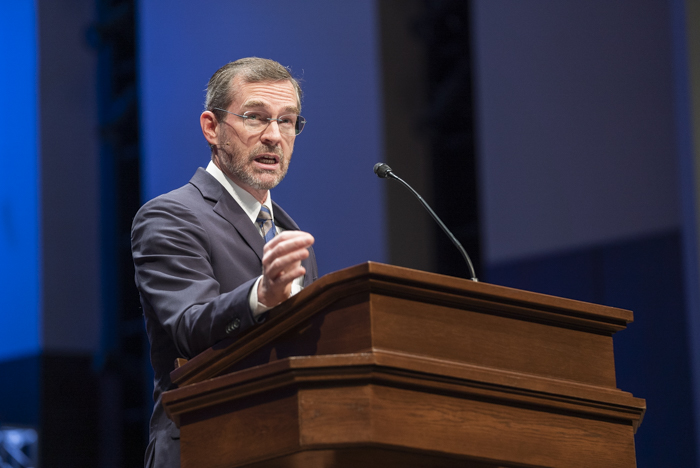Southwestern Seminary celebrates return to ‘authentic biblical Christianity’ during Reformation Day chapel service


The Southwestern Baptist Theological Seminary celebrated the return to “authentic biblical Christianity” during a special Reformation Day chapel service, Oct. 31. The day was the 502nd anniversary of Martin Luther’s nailing of the Ninety-Five Theses to the door of All Saints’ Church in Wittenberg, Germany, in 1517—the event that sparked the Protestant Reformation.
President Adam W. Greenway explained to the chapel audience that the Reformers “recovered key doctrines and truths and teachings that had been suppressed and subjugated over time; to get back to that authentic biblical Christianity—salvation by grace alone through faith alone in Christ alone for the glory of God alone and rooted in the Bible, and the Bible alone, as the written Word of God and as our authority.”
“It is right for us, as heirs of that great tradition, to pause on Oct. 31 and to recognize the truths that truly transformed not just that day, but all time,” Greenway said. “Truths that we must always confess, and truths that we must never allow to become dormant or be seen as insignificant. It is the heart of biblical Christianity—that is what we celebrate today.”
The day’s chapel preacher was Gregory A. Wills, research professor of church history and Baptist heritage and director of the B.H. Carroll Center for Baptist Heritage and Mission at Southwestern Seminary. Calling Reformation Day a “day of remembrance,” Wills encouraged the chapel audience to reflect on what God accomplished through Luther, “who became bold because he feared the Lord and submitted himself to His authority in His Word.”
“The Reformation transformed Western culture in profound ways, but at bottom, the Reformation was an awakening; it was a revival,” Wills said. “The recovery of truth that we celebrate happened because God renewed His work in that day, calling sinners to salvation through faith in Christ Jesus by the power of the word of the cross.”
Preaching from 1 Corinthians 1:17-25, Wills emphasized one doctrine “recovered” by the Reformers: that of sola scriptura, or Scripture alone.
“The doctrine of sola scriptura means both the inerrancy and the authority of the Bible, and these are both necessary corollaries of the fact that God inspired it,” Wills said. “If God inspired it, then it is inerrant, and it is authoritative.”
Wills noted that the Catholic church in Luther’s time “had scriptura, but they did not have sola.”
“And that sola makes all the difference in this case,” he said. “Without sola scriptura, they came to rely on human wisdom to aid and augment the Word of God. And in so doing, they compromised.”
Expounding Paul’s words to the Corinthians, Wills explained that the word of the cross is foolishness to the world but, in reality, is the very wisdom and power of God. Thus, when Christians appeal to the world’s wisdom to advance the word of the cross, they abandon God’s wisdom, he said, adding that when they abandon God’s wisdom and trust in the power of the wisdom of this world, “we compromise God’s Word.”
Wills related Luther’s bold testimony before the Diet of Worms in 1521 presided over by the Holy Roman Emperor Charles V, wherein he refused to recant his statements against the Catholic church, saying he was “bound by the Scriptures.” Wills exhorted the chapel audience to similarly cast themselves “utterly upon the inerrant truth and wisdom of the Scriptures.”
“Remember Martin Luther,” Wills concluded, “what God accomplished through someone who submitted himself in fear to the truth and authority of the Word of God alone. Remember what God accomplished through hundreds of thousands of others who likewise entrusted themselves and their ministries to the power of the Word of God.
“Are you willing to be held captive by the Word of God? Are you willing to be bound by the Word of God? Will you permit it? May it be so. And may God renew His work among us in our day.”



